

Science Topics - Terms, Concepts & Definitions. Meet a scientist: To study conservation, she studies people. Editor’s note: A 2017 survey found that 81 percent of Americans could not name a living scientist.
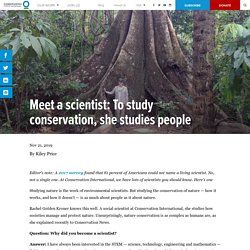
No, not a single one. At Conservation International, we have lots of scientists you should know. Here’s one Studying nature is the work of environmental scientists. True-body-completely-changes-every-7-years. The cells in every human body are constantly in a state of flux.
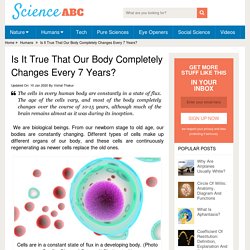
The age of the cells vary, and most of the body completely changes over the course of 10-15 years, although much of the brain remains almost as it was during its inception. We are biological beings. From our newborn stage to old age, our bodies are constantly changing. Different types of cells make up different organs of our body, and these cells are continuously regenerating as newer cells replace the old ones. Cells are in a constant state of flux in a developing body. This has invoked philosophical thought experiments that question the nature of individual identity. Sciencealert. Some scientific concepts are so intricate and discombobulating, they are difficult to convey in words - but a good, old-fashioned visual aid can make it crystal clear.
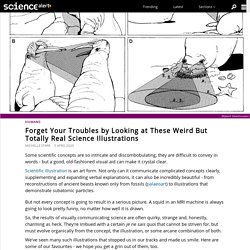
Scientific illustration is an art form. Not only can it communicate complicated concepts clearly, supplementing and expanding verbal explanations, it can also be incredibly beautiful - from reconstructions of ancient beasts known only from fossils (palaeoart) to illustrations that demonstrate subatomic particles. Putting Einstein first: It's time to stop lying to our children about physics - Science News - ABC News. Isaac Newton is a physics icon, but he was wrong.
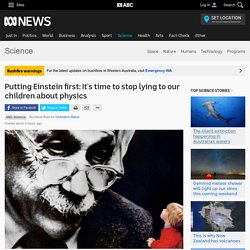
Sure, three hundred years ago, his discoveries about gravity and the laws governing motion revolutionised the world. And yes, sure, those discoveries led to an incredibly useful mechanistic, deterministic view of the universe – in which one thing causes another. It's the story we all still learn in school. But Einstein proved it was wrong a century ago. What did Newton get wrong? 6 Steps of the Scientific Method. The scientific method is a systematic way of learning about the world around us and answering questions.
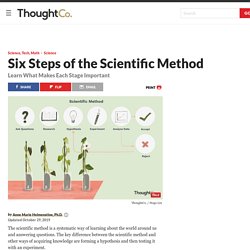
The key difference between the scientific method and other ways of acquiring knowledge are forming a hypothesis and then testing it with an experiment. The Six Steps. Why I Don't "Believe" in "Science" For some years now, one of the left’s favorite tropes has been the phrase “I believe in science.”
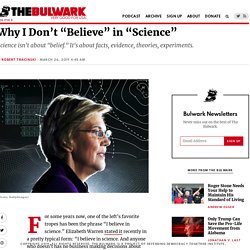
Elizabeth Warren stated it recently in a pretty typical form: “I believe in science. And anyone who doesn’t has no business making decisions about our environment.” This was in response to news that scientists who are skeptical of global warming might be allowed to have a voice in shaping public policy. So what Warren really means by saying “I believe in science” is “I believe in global warming.” Why I don’t ‘believe’ in ‘science’ ” ‘I believe in science’ is an homage given to science by people who generally don’t understand much about it.
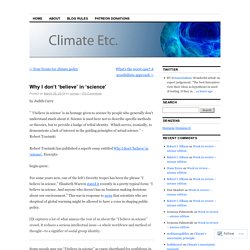
Science is used here not to describe specific methods or theories, but to provide a badge of tribal identity. Which serves, ironically, to demonstrate a lack of interest in the guiding principles of actual science.” – Robert Tracinski. MyCalcTool. GGI Database. Mg/m3 to ppm Converter, Chart. Benefits and challenges of incorporating citizen science into university education. Abstract A common feature of many citizen science projects is the collection of data by unpaid contributors with the expectation that the data will be used in research.
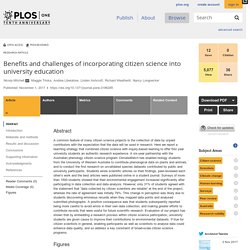
Here we report a teaching strategy that combined citizen science with inquiry-based learning to offer first year university students an authentic research experience. A six-year partnership with the Australian phenology citizen science program ClimateWatch has enabled biology students from the University of Western Australia to contribute phenological data on plants and animals, and to conduct the first research on unvalidated species datasets contributed by public and university participants. Students wrote scientific articles on their findings, peer-reviewed each other’s work and the best articles were published online in a student journal. Surveys of more than 1500 students showed that their environmental engagement increased significantly after participating in data collection and data analysis.
Introduction. Magnetic water treatment pseudoscience. This 3,700-year-old Babylonian clay tablet just changed the history of maths - ScienceAlert. A Babylonian clay tablet dating back 3,700 years has been identified as the world's oldest and most accurate trigonometric table, suggesting the Babylonians beat the ancient Greeks to the invention of trigonometry by over 1,000 years.
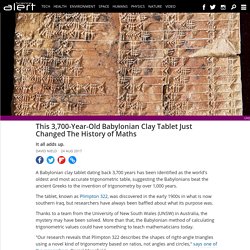
The tablet, known as Plimpton 322, was discovered in the early 1900s in what is now southern Iraq, but researchers have always been baffled about what its purpose was. Thanks to a team from the University of New South Wales (UNSW) in Australia, the mystery may have been solved. More than that, the Babylonian method of calculating trigonometric values could have something to teach mathematicians today. Dynamic Periodic Table. Why Aren’t There More Scientists? A One-Word Explanation – Phenomena: Curiously Krulwich. “The type of science that I do is sometimes known as ‘curiosity-driven research,’” writes Hope Jahren, who teaches paleobiology at the University of Hawai‘i.
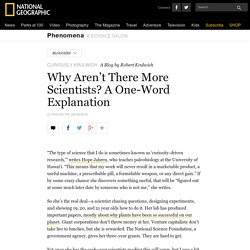
“This means that my work will never result in a marketable product, a useful machine, a prescribable pill, a formidable weapon, or any direct gain.” If by some crazy chance she discovers something useful, that will be “figured out at some much later date by someone who is not me,” she writes. So she’s the real deal—a scientist chasing questions, designing experiments, and showing 19, 20, and 21 year olds how to do it. Home. An answer looking for a question. Zooniverse. Solve Puzzles for Science. The Most Studied Brain in the World was Scanned for a Year and a Half. In Brief Stanford psychologist Russell Poldrack's 18-month study of his own brain reveals new relations between the brain and body. His study makes his brain the most examined in all the world.
The Most Studied Brain. Chaos Theory: A Brief Introduction. What exactly is chaos? The name "chaos theory" comes from the fact that the systems that the theory describes are apparently disordered, but chaos theory is really about finding the underlying order in apparently random data. The Institute of Science In Society. James Gleick. Symbolab Math Solver - Step by Step calculator. Institute for Health Metrics and Evaluation. Modelling the Relationship between the Food System and Health, Development, and the Environment. The aim of this project is to develop the first integrated model of environmental sustainability, health and economic development.
Such a model will allow for in-depth exploration of food production and trade scenarios. Global food systems are highly complex. They are both influenced by and have an influence on health, economic development and the environment. They will face considerable strain over the coming decades as income growth, urbanisation and globalisation lead to shifts towards Western dietary patterns (e.g. high in meat and processed foods) across the developing world. Under these conditions, the challenge is to find a sustainable method to feed the world’s increasing population, whilst considering the trade-offs and synergies between health, environmental sustainability and economic development. GBD Data Visualizations. WebElements Periodic Table of the Elements. Future - Is another human living inside you?
This story is part of BBC Future’s “Best of 2015” list, our greatest hits of the year. Browse the full list. Once upon a time, your origins were easy to understand. Your dad met your mum, they had some fun, and from a tiny fertilised egg you emerged kicking and screaming into the world. You are half your mum, half your dad – and 100% yourself. The Big Six: Our innovation hacks for the future - CSIRO blog. German Scientists Discover That Water Has A Memory - TruthTheory. By Jess Murray Truth Theory. Water memory - Wikipedia. Benveniste's study[edit] Every breath you take - Minkukel.
Home - Minkukel. Diverse and widespread contamination evident in the unmapped depths of high throughput sequencing data. No 'lost tribes' or aliens: what ancient DNA reveals about American prehistory. Genetics research has transformed our understanding of human history, particularly in the Americas. All About Grounding. Resonance Science Foundation.